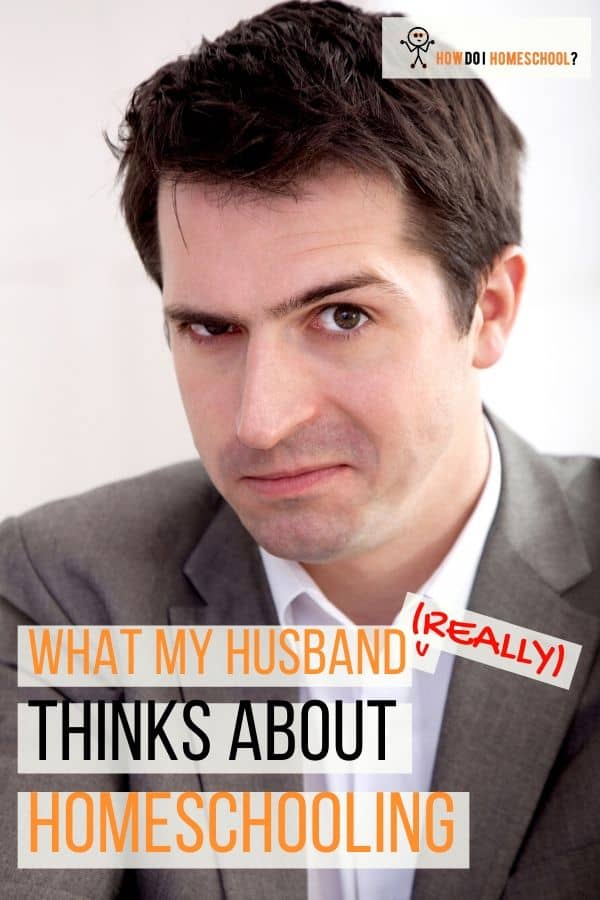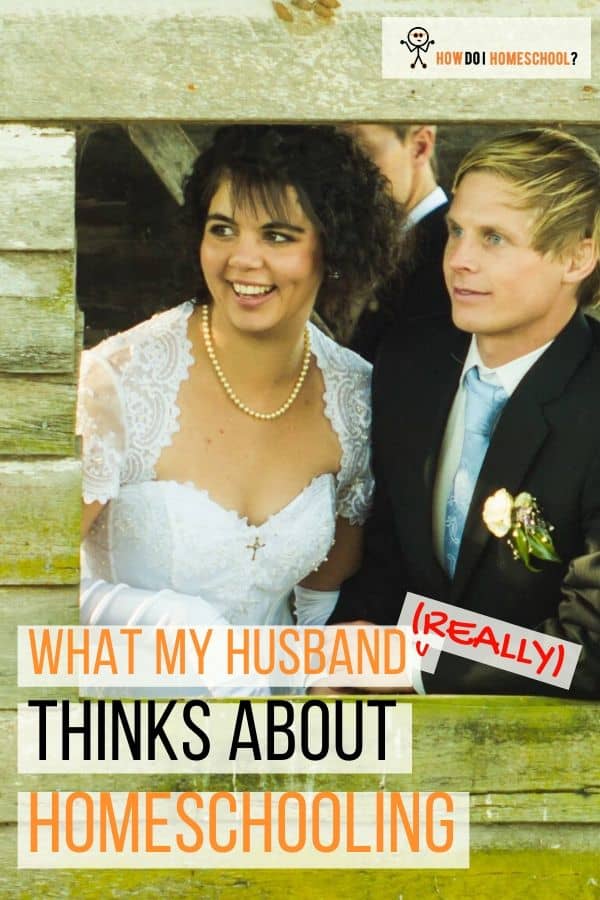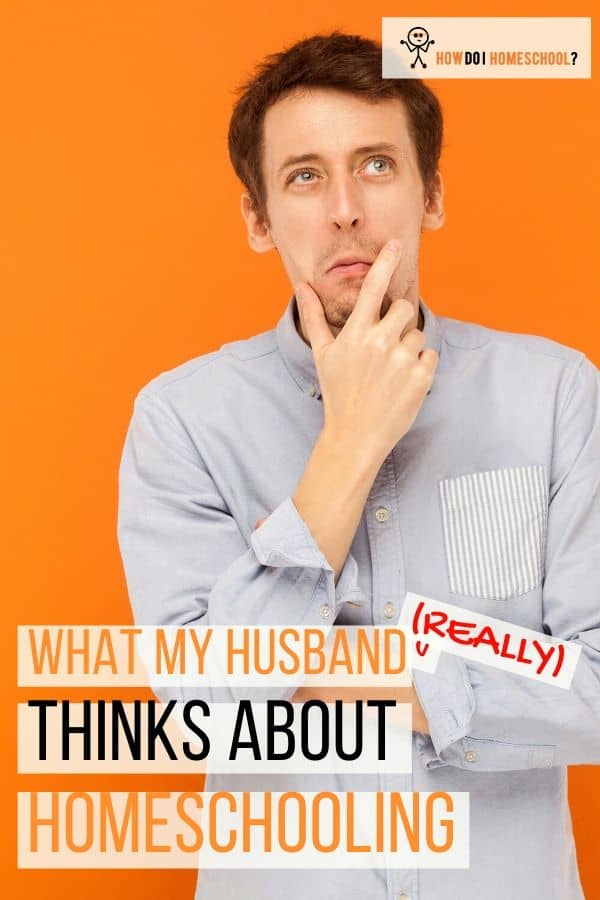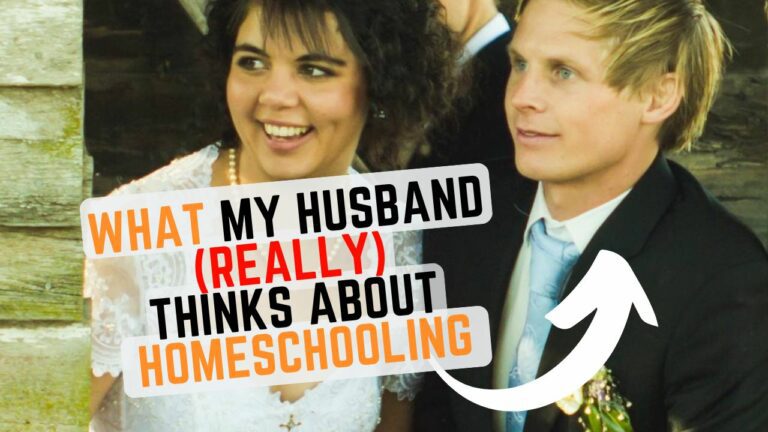On our very first date, I told my (future) husband I wanted to homeschool my children if I ever had any, and (in more semantically acceptable language) if he wasn’t happy with that, we had better make that our last date. Thankfully he was in enough love with me to agree to this happily.
However, as our relationship progressed, after we’d been married for 6 months, my husband realized I wasn’t wisdom reincarnated.

I hope you enjoy reading this blog post. If you want to do my course on how to homeschool, click here.
While this relieved both of us, it also brought conflict as many of our conversations were being rehashed and questioned – including our homeschooling conversations.
I discovered I was trying to bully my husband into thinking like me on home education (and many other) issues, and I also found this wasn’t going to be a good way to start home education.
This is because if he wasn’t going to be on my side, homeschooling without support would be a very lonely journey.

Some of the links in this post are affiliate links.
After six years of marriage, time has passed, and I believe my husband is coming around to the idea.
So I decided to interview him and ask some hard-hitting questions (with my promise not to fight back to the answers).
Here are the questions I asked my husband in the interview:
- What is your educational background?
- When you first heard about homeschooling, what did you think about it?
- Did you know any homeschoolers as you were growing up, and if so, how did they shape your perception of homeschoolers in general?
- How would you describe the grown-up homeschoolers you know now?
- Are you concerned about our children’s academic achievement falling short of standards if we homeschool?
- Are you concerned about the ‘homeschooling socialization‘ question people talk about?
- Do you have any other concerns about home-educating our children?
- Do you think our children will miss out on some opportunities they might get in school?
- Do you think they’ll have opportunities to do things homeschooling that they might not have if they went to school?
- Are there any subjects you think homeschools can teach better than schools?
- What was the least effective thing I have done to try and convince you about home education that has actually turned you off homeschooling?
- What was the most effective thing I have done to try to convince you about homeschooling that has worked?
- When we homeschool, will you be a little concerned about what some of your friends will say if you tell them you’re home educating?
Let’s look at his answers!
(If you don’t want to read it all, you can watch his interview in the video below…and yes, this was us on our wedding day six years ago!)
What is your educational background?
I guess the main thing is that I went through the traditional schooling system.
I went to a public primary school and then I went to a private high school. I think the reason I went to a private high school is because my parents really valued education and that was probably the best school around – it cost them a lot of money.
Was the private school a Christian school?
It was a grammar school so it wasn’t specifically a Christian school but it certainly promoted Christain values.
But, I would say the main focus was academia, and then I would say there were Christian themes.
We did chapel once a week and there was a Christian group at lunchtime but the vast majority of my peers were non-Christians.
We probably had a hundred kids in our year group and I’d say 10 of those were really active Christians.
When you first heard about homeschooling, what did you think about it?
I definitely thought it was an interesting idea.
I never really knew anyone who had done it before.
It had certainly never been tabled to me by my parents as an option (or any of my other friends – none of their parents had really spoken to them saying it was a realistic option).
I was more intrigued by it as an option and interested to see how it would work and comparing it to the school system.
Did you know any homeschoolers as you were growing up, and if so, how did they shape your perception of homeschoolers in general?
[I asked this question because I read a study once which said that people who’ve had homeschooled friends in childhood tend to think much more positively about homeschoolers in general; in contrast, people who don’t know any homeschoolers tend to (moreso) think they’re weird and unsocialized.]
I didn’t know any really well, but I’d heard of one or two.
Actually, the only one that comes to mind is a guy that came to our high school in year 11 and he had previously been homeschooled his whole life and had just come to school for the last two years (Year 11 and Year 12).
And we just thought he was quite weird generally.
It took him quite a while to fit in – which is understandable because he’d never been to a school before. But, he was the only homeschooler who I’d come across in school.
How would you describe the grown-up homeschoolers you know now?
To generalize I would say they are an advertisement for homeschooling. They’re a pretty good product if you want to put it that way. They seem to have a good connection with Christianity. The two seem to go relatively closely – so, raised in Christian families.
And they generally seem to be quite diligent kinds of people – and pleasant.
Maybe some of them are quieter than the average person, not that that’s necessarily a bad thing.
I’ve enjoyed getting to know the majority. Most of them are really nice, humble, Christian sorts of people. But, there are exceptions, but generally speaking, they’re really good.
Are you concerned about our children’s academic achievement falling short of standards if we homeschool?
Not really, no.
I think the main advantage academically that homeschooling has is the ratio of students to teachers. 1 to 1 or 2 to 2 or 3 to 3 or how ever many kids there are in the family.
And that ratio would really facilitate learning well.
All questions are on the table. You don’t have to wait like you do in school for other kids or get lost between the cracks as the class progresses but you don’t.
So, I think that the ratio would really facilitate good academic standards.
And just having the time to digest new concepts and information. At school, there is a lot of wasted time – in terms of:
- classroom management,
- managing kids,
- getting to and from the classrooms,
- discipline,
- lunchtime and recess and
- time getting to and from recess and lunchtime
There’s a lot of wasted time so I think you can be a lot more efficient in homeschooling. And if your child is motivated they can learn more.
And I guess the thought today is that there are so many online resources to learn stuff which would help as well – which would help the parents teach effectively.

Are you concerned about the homeschooling socialization thing people talk about?
No is probably the short answer.
I think one thing I’ve picked up from talking to you and other people about homeschooling is that homeschooling is only as good and as healthy or unhealthy as the parents.
The parents are obviously leading it the majority of the time – and if they’re unhealthy or they’re bad or they have their own agenda – then that’s going to flow through to the kids.
On the flip side, if the parents are really good and healthy and committed to the child’s best interests, then homeschooling can be really great.
So in relation to homeschooling, if parents seek to address that issue, it should be fine. There shouldn’t be any problem at all.
I think the trick is:
- identifying [lack of socialization] as a potential issue (if it’s not addressed) and
- being really intentional about addressing it and putting measures in place to make sure the child is socialized well and has an ability to empathize with other children…and sometimes the humility you get with being around other people.
Socializing can really grow you as a person – as much as it may test you – it’s a really important thing for your growth and ultimately, how you love other people, which is the crux of Christianity.
So I think you’ve just got to be intentional about it.
Getting connected with a homeschooling group in the local region is a good idea. Sport is a no-brainer. There’s going to be other children and parents there which teaches teamwork. There are lots of social opportunities there.
And there are lots of different clubs. If you live in a community, there are lots of different ways you can connect your kids with people.
Do you think our children will miss out on some opportunities they might get in schools?
Yes, potentially – like at our school we went on heaps of camps, snow camps and we used to have music and drama competitions every year.
So, it was for kids who were interested in music, dancing, or drama.
We did photography. We had these amazing expensive photography labs which were great. You’d go to the darkroom and develop photos.
It was a private school so it had a fair bit of cash – so the facilities were pretty good.
The school had an incredible wood-working lab where you could learn to craft wood.
So, yeah, I think there’s an element where you can miss out on resources. I mean a home environment cannot have the resources a well-funded school can have.
So you can miss out on resources, events, and opportunities. But again, I think you can mitigate a lot of that by connecting with your community and seeking out people who have those resources and then getting involved in them.
I’m pretty sure things like the Duke of Edinborough is something homeschoolers can get involved in. You don’t need to be from a school. There are programs in the community you can utilize – scouts – all that kind of stuff.
Do you think they’ll have opportunities to do things homeschooling that they might not have if they went to school?
Yes. From what I’ve heard homeschooling is quite flexible time-wise. By virtue of that, it frees children up to do things they might not be able to if they went to school.
For example, if homeschoolers spent four hours doing formal education and then they have lunch, they’ll have a stack of time in the afternoon to do an activity of their choice.
I think just by virtue of having that time means they can be more creative and problem-solve and do different things.
So it might be building a cubby-house, or building a shed.
You know – just having time to do something your children are invested in – and they’re doing it because they want to – not because the curriculum tells them they have to.
That in itself is an opportunity.
With the time there is more freedom and flexibility.

Are there any subjects you think homeschools can teach better than schools?
That’s one of the other things that interests me in homeschooling.
That is, learning more practical things – not that learning more theoretical things is bad or wasteful – they definitely have a place and are really necessary.
But, we do live in a practical world where things need to get done and services need to be provided to people. I wish I’d received more practical skills and wisdom in school.
Regarding dealing with finances: In Year 11 I did Economics and it was just all theory dealing with supply and demand and things like that but the rubber didn’t hit the road in terms of:
- savings,
- interest rates,
- shares,
- investing,
- compound interest,
- buying a house or
- managing your superannuation.
If I’d known these things in my late teens it would have helped me immensely.
Regarding character building:
In our school, we touched on things about character and thinking about who you are as a person. I remember going on a two day camp for that.
But, really, that’s the tip of the iceberg with what you need to go into.
I think for a young person – particularly in the teenage years – I mean that’s the greatest question as a teenager is, ‘Where am I at?’ ‘Who am I?’ ‘Where is my identity?’ ‘How do I want to be perceived?’ ‘What am I good at?’ and just fundamentally, ‘Where’s my value at as a person?’
They’re the deep questions and if they’re not addressed in those early teenage to late teenage years, then they’re not addressed then I feel like people are often clutching at straws if they try to answer these questions later in life.
Understanding character has great potential if you’re homeschooling.
But, again, that just comes down to the parents. If the parents think that’s not important then it might not happen at all.
But, if they do think it’s important then I think homeschooling is a great platform to mentor a child. And you just can’t get that sort of close mentorship at school.
Regarding teaching Christianity – teaching children through a Christian lens is helpful and very practical as well.
What was the least effective thing I have done to try and convince you about homeschooling, but that has actually turned you off homeschooling?
(You don’t do this anymore, but) I think when you get really passionate about anything you can think it’s the only way and it has to be done this way, for everyone. And you blanket that.
Way back in the earlier days when you were overzealous about homeschooling you were saying everyone should be homeschooled and that turned me off because I don’t think that’s the case.
There are so many circumstances where it’s not appropriate.
So mandating it for everyone turned me off. But, you were just really passionate about it and it didn’t come out of a bad intention – you were just really into it.
But, I think you’ve mellowed on that now and think it’s a great idea for a lot of people – particularly Christians – and that’s what you’re advocating for and spruiking the benefits of it. But, I think now you’d say it’s not for everyone and it’s a big commitment. And structurally in the family contexts sometimes it’s just not practical.
What was the most effective thing I have done to try to convince you about homeschooling that has worked?
When you promote the idea of the free-ness to learn and that the child has that space to learn and explore things and make mistakes.
I kind of wish I’d had that space. I mean, I’ve never built a shed, house, surfboard, or something like that.
And just to have that space and freedom to have a go and make a mistake and knock you down and revise your plans and try again. That freedom to make mistakes appealed to me.
And, I think childhood and teenage years are an ideal time to make mistakes and learn. That’s how we grow.
I can think of a few homeschoolers who really impress me (not to say there’s not a stack of people who went to school who don’t impress me) – there’s that too. That was nice to see actual real-life people who’ve done it.
When we homeschool, will you be a little concerned about what some of your mates will say if you tell them you’re homeschooling?
Yes. I think so.
Particularly because I have a lot of mates from school and most people have been to school.
So, yes, there’s definitely preconceptions about homeschooling. And there are some horror stories out there and some myths about being completely isolated and cut off from the world and that.
There’s going to be some people who have some misconceptions about it.
But, I’m a little bit concerned but they know me and they will respect our decision with this one.
And I guess that’s what you’re trying to do – just to break down some preconceptions and myths about homeschooling in terms of awareness and that’s really good. [I wrote a book called Why on Earth Homeschool: The Case for Australian Christian Homeschooling which does just this. You can find a copy at this link.]
Homeschooling might raise a few eyebrows and that’s okay.
Subscribe to How to Homeschool (my Youtube channel!)
Have you caught the homeschooling bug? Eager to delve deeper into the realm of unconventional education?
Well, my curious comrades, rejoice!
There are splendid avenues awaiting your exploration.
Firstly, hop on over to my YouTube channel, where a treasure trove of homeschooling wisdom awaits. From practical tips to delightful anecdotes, I unravel the mysteries of homeschooling with a touch of wit and wisdom.
Subscribe, hit that notification bell, and embark on an enlightening journey with me.
Enroll in the Homeschool Parenting Program
For those wanting a comprehensive guide to homeschooling, look no further than my Homeschool Parenting Program.
This online course will equip you with the knowledge, strategies, and confidence to navigate the exhilarating world of homeschooling like a seasoned pro.
Enroll today and unlock the door to extraordinary educational possibilities.



